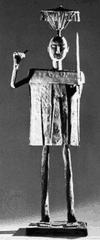- Fon
-
1. a member of a people living mainly in Benin.2. the Kwa language, very closely related to Ewe, spoken by the Fon people.
* * *
People of southern Benin and adjacent parts of Togo.They speak a dialect of Gbe, a Kwa language of the Niger-Congo language family. Numbering about 3 million, the Fon are mainly farmers. Craft specialists include male ironworkers, sculptors, and weavers and female potters. The primary Fon social unit is the polygynous family, each woman and her children occupying a house within a compound. The village under a hereditary chief is the traditional political unit. Dahomey kingdom was peopled principally by Fon. Iron statue of the god of arms and war, made by the Fon of Benin, in the Musée de l'Homme, ...Marc and Evelyne BernheimWoodfin Camp and Associates
Iron statue of the god of arms and war, made by the Fon of Benin, in the Musée de l'Homme, ...Marc and Evelyne BernheimWoodfin Camp and Associates* * *
▪ peoplealso called Dahomeypeople living in the south of Benin (called Dahomey until 1975) and adjacent parts of Togo. Their language, also called Fon, is closely related to Ewe and is a member of the Kwa branch of the Niger-Congo family of African languages. The Fon numbered more than 1.7 million in the early 21st century.The traditional economy of the Fon is based on agriculture, relying mainly on corn (maize), cassava, and yams for subsistence; palm oil is the major commercial product. Men clear and hoe the fields, and both men and women plant; the crops are tended and harvested by women. A cooperative organization of adult males aids in such tasks as land clearing and house building. Each village also has a group of professional hunters who are surrounded by supernatural sanctions. Craft specialists include male ironworkers and weavers and female pottery makers.The primary Fon social unit is the polygynous family, each woman and her children occupying a house within a compound. A lineage, consisting of families related through male descent, usually occupies several neighbouring compounds; the eldest male member serves as the lineage head. Patrilineal clans dispersed throughout Dahomey were formerly important, but clan organization has broken down in recent times. The worship of ancestors, however, remains a major feature of Fon religion.The village under a hereditary chief was traditionally the primary political unit. In the Kingdom (king) of Dahomey, which flourished in the 18th and 19th centuries, the chiefs were representatives of a powerful king. A main function of the kingship was the conduct of war, which was followed by the Annual Custom, at which prisoners were sacrificed and the goodwill of royal ancestors was sought. The king also exercised judicial powers, collected tribute, and filled political offices. In general, members of the royal clan did not hold political offices because it was believed they would be tempted to intrigue against the king; important posts were filled by commoners who would owe their appointment to the king and thus remain loyal.* * *
Universalium. 2010.
